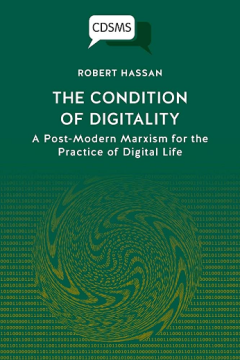Ditapis dengan
E-book The Psychology of Art and the Evolution of the Conscious Brain
There are as many ways of looking at art as there are viewers of art. That huge diversity is one indication that we humans are highly distinctive lot of creative people. It does not mean, however that there are no universal principles of perception and cognition that apply to all of us as we view and appreciate art. This tutorial on art is presented in the spirit of trying to find general princ…
- Edisi
- -
- ISBN/ISSN
- 0262194848
- Deskripsi Fisik
- 290 hlm
- Judul Seri
- -
- No. Panggil
- 701 SOL t
E-book The Cold War: A Very Short Introduction
Explanations for the onset of the Cold War must begin with World War II. A conflict that ranks, by any conceivable measure, as the most destructive in human history, World War II brought unparalleled levels of death, devastation, privation, and disorder. ‘The conflagration of 1939–1945 was so wrenching, so total, so profound, that a world was overturned,’ notes historian Thomas G. Paterso…
- Edisi
- -
- ISBN/ISSN
- 9780192801784
- Deskripsi Fisik
- 201 hlm
- Judul Seri
- -
- No. Panggil
- 909.82 MAH t
E-Book Researching Animal Research
Animal research is part of a complex web of relations made up of humans and animals, practices inside and outside the laboratory, formal laws and professional norms, and social imaginaries of the past and future of medicine. Researching Animal Research sets out an innovative approach for understanding and intervening in the social practices that constitute animal research. It proposes the idea …
- Edisi
- -
- ISBN/ISSN
- 9781526165770
- Deskripsi Fisik
- 480 halaman
- Judul Seri
- -
- No. Panggil
- 590 DAV r
E-book The Hollywood Historical Film
The history film has played an exceptionally powerful role in shaping our culture’s understanding of the past, an influence that derives not simply from the cinema’s unequaled ability to re-create the past in a sensual, mimetic form, but also from its striking tendency to arouse critical and popular controversy that resonates throughout the public sphere. American films centered on the past…
- Edisi
- -
- ISBN/ISSN
- 9781405146036
- Deskripsi Fisik
- 192 hlm
- Judul Seri
- -
- No. Panggil
- 791.43 BUR t
E-book Handbook of Clay Science
Since people who work with clay come from diverse backgrounds and have diverse interests, there are probably as many concepts and views of clay as there are clay mineral species. It is not surprising, therefore, that clay scientists have varied trainings, including geology, mineralogy, chemistry, physics, and biology, and hold different perspectives. The multi-disciplinary nature of clay scienc…
- Edisi
- -
- ISBN/ISSN
- 9780080441832
- Deskripsi Fisik
- 1248 hlm
- Judul Seri
- -
- No. Panggil
- 549.6 CHU h
E-book A Short History of Bali : Indonesia's Hindu Realm
In the early 1980s I was sitting in the coffee shop of the Bali Beach Hotel in Sanur, reflecting on the strange fact that Dutch troops had come ashore nearby, less than 80 years previously, on their way to perpetrate one of the more extraordinary massacres in the history of colonialism. I did not know that the Japanese had also landed in this same area in 1942, or that the Dutch had returned he…
- Edisi
- -
- ISBN/ISSN
- 1865088633
- Deskripsi Fisik
- 285 hlm
- Judul Seri
- -
- No. Panggil
- 959.8 PRI a
E-book A Geography of Time : The Temporal Misadventures of a Social Psycholog…
My class was scheduled from ten until noon. Many students came late. Several arrived after 10:30. A few showed up closer to eleven. Two came after that. All of the latecomers wore the relaxed smiles I later came to enjoy. Each one greeted me, and although a few apologized briefly, none seemed terribly concerned about being late. They assumed that I understood. That Brazilians would arrive late …
- Edisi
- -
- ISBN/ISSN
- 9781851684656
- Deskripsi Fisik
- 280 hlm
- Judul Seri
- -
- No. Panggil
- 115 LEV a
E-book The Poetry of Cao Zhi
Readers of this volume will be able to tell from the Introduction andnotes throughout the book how great a debt I owe to many distin-guished scholars past and present. Without them, this work would havebeen impossible. Here I want to express my gratitude to a number ofpeople who have influenced this project more directly. The book isdedicated to David R. Knechtges, wh…
- Edisi
- -
- ISBN/ISSN
- 9781501515637
- Deskripsi Fisik
- 431 hlm
- Judul Seri
- -
- No. Panggil
- 895.1 CUT t
E-book Bioethics and the Holocaust : A Comprehensive Study in How the Holocau…
A personal word: many years ago, when we were first developing the United StatesHolocaust Memorial Museum, we struggled with the issue of how to end the perma-nent exhibit. We had come up with an appropriate beginning that would serve thefunction of taking visitors off the National Mall, taking them back what was thenfifty years in time, moving them a continent away and introducing them to a Eu…
- Edisi
- -
- ISBN/ISSN
- 9783031019876
- Deskripsi Fisik
- 326 hlm
- Judul Seri
- -
- No. Panggil
- 614 BER b
E-book Incomparable Poetry : An Essay on the Financial Crisis of 2007–2008 …
What is it like to write poetry right now at this moment in world history? What is it unlike? Or, to avoid comparisons at all, what is poetry now? Fascists and an “alt-right” search for platforms, opposed but not often enough; global warming renders laugh-able our comfortable and anachronistic sense of cyclical change; secular stagnation mocks the entire program of austerity; a fra…
- Edisi
- -
- ISBN/ISSN
- 9781950192847
- Deskripsi Fisik
- 163 hlm
- Judul Seri
- -
- No. Panggil
- 891.6 KIE i
E-book Lockdown Cultures : The arts and humanities in the year of the pandemi…
April 2020. It had begun as little more than a flicker on a news feed, a tiny spark in a media agenda that was already crackling with the electric charge of a world increasingly divided. But as the Covid-19 crisis began to take hold, with every new outbreak confirming its deadly horror, two opposing phenomena very quickly began to emerge. The first was a kind of global solidarity in…
- Edisi
- -
- ISBN/ISSN
- 9781800083394
- Deskripsi Fisik
- 346 hlm
- Judul Seri
- -
- No. Panggil
- 614.5 BAK l
E-book The Web as History : Using Web Archives to Understand the Past and the…
The web has been with us for more than a quarter of a century. It has become a daily and ubiquitous source of information in many peoples’ lives around the globe. But what does it tell us about historical and social change? For a researcher in the twenty-second century, it will seem unimaginable that someone studying the twenty-first c…
- Edisi
- -
- ISBN/ISSN
- 9781911307563
- Deskripsi Fisik
- 298 hlm
- Judul Seri
- -
- No. Panggil
- 025.042 ACK t

E-book The Condition of Digitality
- Edisi
- -
- ISBN/ISSN
- 9781912656677
- Deskripsi Fisik
- 212 hlm
- Judul Seri
- A Post-Modern Marxism for the Practice of Digital Life
- No. Panggil
- 001.1 HAS t
- Edisi
- -
- ISBN/ISSN
- 9781912656677
- Deskripsi Fisik
- 212 hlm
- Judul Seri
- A Post-Modern Marxism for the Practice of Digital Life
- No. Panggil
- 001.1 HAS t
E-book The Science of War : Strategies, Tactics, and Logistics
Today in the world of 24-hour news, we cannot help but be aware of the brutality and human cost of war. It is difficult to imagine the festive atmosphere of parades and cheering as local regiments marched off to fight in the American Civil War, or even in the early days of World War I. Yet in spite of our lack of illusion about the reality of war, the idea of war still holds an enduring fascina…
- Edisi
- -
- ISBN/ISSN
- 9781615307500
- Deskripsi Fisik
- 349 hlm
- Judul Seri
- -
- No. Panggil
- 355.4 CUR t
E-book Living Planet Report 2020
The global Living Planet Index continues to decline. It shows anaverage 68% decrease in population sizes of mammals, birds, amphibians, reptiles and fish between 1970 and 2016. A 94% decline in the LPI for the tropical subregions of the Americas is the largest fall observed in any part of the world. Why does this matter? It matters because biodiversity is fundamental to human life on Earth, and…
- Edisi
- -
- ISBN/ISSN
- 9782940529995
- Deskripsi Fisik
- -
- Judul Seri
- -
- No. Panggil
- 333.7 AND l
E-book Emotions in Korean Philosophy and Religion : Confucian, Comparative, a…
he nature of emotions was generally criticized in the Western tradition of philosophy. This criticism of the emotional part of human nature and experience is known to have its root in the mainstream Platonic tradition. In other words, it has championed rationality/reason against emotional-ity/emotion, especially from certain scholarly standpoints. The Western dualism of reaso…
- Edisi
- -
- ISBN/ISSN
- 9783030947477
- Deskripsi Fisik
- 397 hlm
- Judul Seri
- -
- No. Panggil
- 181.119 BAK e
E-book Insurance Handbook : A Guide to Insurance what it does and how it works
The insurance industry safeguards the assets of its policyholders by transferring risk from an individual or business to an insurance company. Insurance companies act as financial intermediaries in that they invest the premiums they collect for providing this service. Insurance company size is usually measured by net premiums written, that is, premium revenues less amounts paid for reinsurance.…
- Edisi
- -
- ISBN/ISSN
- 9780932387479
- Deskripsi Fisik
- 205 hlm
- Judul Seri
- -
- No. Panggil
- 368 WIL i
E-book Genetics and Molecular Biology
In this book we will be concerned with the basics of the macromolecular interactions that affect cellular processes. The basic tools for such studies are genetics, chemistry, and physics. For the most part, we will be concerned with understanding processes that occur within cells, such as DNA synthesis, protein synthesis, and regulation of gene activity. The initial studies of these processes u…
- Edisi
- 2nd ed.
- ISBN/ISSN
- 0801846749
- Deskripsi Fisik
- 715 hlm
- Judul Seri
- -
- No. Panggil
- 572.8 SCH g
E-book New Libraries in Old Buildings : Creative Reuse
Formerly seen as a menial architectural task, adaptive reuse has come into its own. It is no longer a secret, and certainly no longer a novel idea, that the archi-tecture of adaptive reuse is, in terms of architectural creativity, beauty and impor-tance, in no way inferior to designing and building a brand-new building (Hauke and Werner 2011).Architecture incorporating existing …
- Edisi
- -
- ISBN/ISSN
- 9783110679663
- Deskripsi Fisik
- -
- Judul Seri
- -
- No. Panggil
- 727.8 HAU n
E-book Open Standards for the Practice of Conservation
Without more rigorous measurement of effectiveness and disciplined recording of our efforts, how will we know if we are progressing as rapidly as needed to achieve our conservation goals? How will we become more efficient? How will we learn from one another? And how will we be able to demonstrate our achievements and build the public and political will needed to expand our resources and meet th…
- Edisi
- -
- ISBN/ISSN
- -
- Deskripsi Fisik
- 81 hlm
- Judul Seri
- -
- No. Panggil
- 639.9 STE o
E-book Perry's Chemical Engineer's Handbook
This is the new edition of chemical and process engineers' favorite reference. Previous editions of this authoritative, comprehensive handbook have sold more than 887,000 copies. This Seventh Edition contains 50% new or revised material, including new information on condensers, reboilers, evaporators, and vessels; multicomponent and enhance distillation including azeotropic, extractive, and rea…
- Edisi
- 7th ed.
- ISBN/ISSN
- -
- Deskripsi Fisik
- 2559 hlm
- Judul Seri
- -
- No. Panggil
- 660.01 PER p
E-book 1001 Cara Bicara Orang Tua dengan Remaja
Secara universal gambaran mengenai suatu keluarga kerap ditampilkan dalam sebuah simbol di mana para anggota keluarga tampak bergandengan tangan atau saling berdekatan antara satu dengan yang lain. Hal ini menunjukkan adanya harapan akan suatu ikatan dan hubungan yang dekat antar anggota keluarga. Kedekatan hubungan tersebut tentu tidak terjadi secara tiba-tiba melainkan melalui sejumlah inter…
- Edisi
- -
- ISBN/ISSN
- -
- Deskripsi Fisik
- 176 hlm
- Judul Seri
- -
- No. Panggil
- 173 EDI s

Biokimia Harper
Buku ini memberikan mahasiswa kedokteran dasar-dasar ilmu biokimia dengan cara yang menarik dan relevan. Dalam buku yang ringkas tetapi komprehesif ini, tercakup studi kasus terbaru, diskusi mengenai penyakit-penyakit biokimia dan informasi klinis. * Terdapat pula informasi mengenai keadaan medis yang menjadi prevalensi, mencakup hiperkolesterolemia, obesitas, dan diabetes melitus. * Memberi …
- Edisi
- Cet. 1 Ed. 25
- ISBN/ISSN
- 9794485934
- Deskripsi Fisik
- ix + 883 hlm.; illus.
- Judul Seri
- -
- No. Panggil
- 572 MUR b
E-book Jesuit Art
What is Jesuit art?1 A person could answer: objects made by and forJesuits; the decoration of Jesuit churches; or simply the physical remnants of the Society of Jesus, from the confirmation of the order by Pope Paul iii (1468–1549, r.1534–49) on September 27, 1540 to its suppression by Pope Clement xiv (1705–74, r.1769–74) on July 21, 1773. None of these definitions would be wrong, but …
- Edisi
- -
- ISBN/ISSN
- 978-90-04-49822-8
- Deskripsi Fisik
- 226 hlm
- Judul Seri
- -
- No. Panggil
- 704.948 MOC j
E-book Fisika Termal
Dalam proses memasukkan suhu, kami menyinggung konsep perpindahan panas yang intuitif.Pada tahap ini, cukup dikatakan bahwa jika dua benda pada suhu yang berbeda dibawa kedalam "kontak termal", proses yang dikenal sebagai konduksi panas dapat terjadi yang memungkinkan energi untuk ditransfer antar benda meskipun benda bertukar tidak peduli dan tidak melakukan apapun pekerjaan mekanis satu sama …
- Edisi
- -
- ISBN/ISSN
- 9780128033043
- Deskripsi Fisik
- 441 hlm
- Judul Seri
- -
- No. Panggil
- 530 SEK f

E-book Jenis-Jenis Karang di Teluk Ambon
Salah satu hasil penelitian panjang tentang jenis-jenis karang yang telah dilakukan oleh peneliti di lingkungan UPI mewujud buku ini. Bukan hanya berisi rangkuman gambar-gambar dan deskripsi 167 jenis karang di perairan Teluk Ambon, lebih dari itu buku ini merupakan satu bentuk kepedulian UPI terhadap eksistensi karang ambon di tengah gejolak dinamika perairan Teluk Ambon dalam kurun waktu 32 t…
- Edisi
- Cet. 1
- ISBN/ISSN
- 978602490926
- Deskripsi Fisik
- xii hlm. + 287 hlm.; 14,8 × 21 cm
- Judul Seri
- -
- No. Panggil
- 593.6598 5 ALI j

Electronic devices and circuit theory
- Edisi
- -
- ISBN/ISSN
- 0132495171
- Deskripsi Fisik
- xxi + 909 hal; 21 x 28 cm
- Judul Seri
- -
- No. Panggil
- 621.385 BOY e
- Edisi
- -
- ISBN/ISSN
- 0132495171
- Deskripsi Fisik
- xxi + 909 hal; 21 x 28 cm
- Judul Seri
- -
- No. Panggil
- 621.385 BOY e

Troubled Blood
Private detective Cormoran Strike is visiting his family in Cornwall when he is approached by a woman asking for help finding her mother, Margot Bamborough, who went missing under mysterious circumstances in 1974. Strike has never tackled a cold case before, let alone one forty years old. But despite the slim chance of success, he is intrigued and takes it on, adding to the long list of cases …
- Edisi
- cet. 1
- ISBN/ISSN
- 978-0-316-49893-7
- Deskripsi Fisik
- 933 hlm; 15 x 23,5 cm
- Judul Seri
- -
- No. Panggil
- 823 ROB t
Prayers for the Assassin
What would happen to America if the extremists won? Seattle, 2040. The Space Needle lies crumpled. Veiled women hurry through the streets. Alcohol is outlawed, replaced by Jihad Cola, and mosques dot the skyline. New York and Washington, D.C., are nuclear wastelands. At the edges of the empire, Islamic and Christian forces fight for control, and rebels plot to regain free will. Courageous reb…
- Edisi
- cet. 1
- ISBN/ISSN
- 1-4165-0768-X
- Deskripsi Fisik
- 484 hlm; 10,5 x 17 cm
- Judul Seri
- -
- No. Panggil
- 823 ROB p

Lethal White
"I seen a kid killed... He strangled it, up by the horse." When Billy, a troubled young man, comes to private eye Cormoran Strike's office to ask for his help investigating a crime he thinks he witnessed as a child, Strike is left deeply unsettled. While Billy is obviously mentally distressed, and cannot remember many concrete details, there is something sincere about him and his story. But be…
- Edisi
- cet. 1
- ISBN/ISSN
- 978-0-316-45339-4
- Deskripsi Fisik
- 650 hlm; 15 x 23,5 cm
- Judul Seri
- -
- No. Panggil
- 823 ROB l
E-book Exploring Jesuit distinctiveness
The volume theme is the distinctiveness of Jesuits and their ministries. It explores the quidditas Jesuitica, or the specifically Jesuit way(s) of proceeding in which Jesuits and their colleagues operated from historical, geographical, social, and cultural perspectives. Thanks to generous support of the Institute for Advanced Jesuit Studies at Boston College, this volume is available in Open Ac…
- Edisi
- -
- ISBN/ISSN
- -
- Deskripsi Fisik
- 340 hlm
- Judul Seri
- -
- No. Panggil
- 266 MAR e
E-book Jenis-jenis karang di teluk Ambon
Salah satu hasil penelitian panjang tentang jenis-jenis karang yang telah dilakukan oleh peneliti di lingkungan LIPI mewujud buku ini. Bukan hanya berisi rangkuman gambar-gambar dan deskripsi 167 jenis karang di perairan Teluk Ambon, lebih dari itu buku ini merupakan satu bentuk kepedulian LIPI terhadap eksistensi karang ambon di tengah gejolak dinamika perairan Teluk Ambon dalam kurun waktu 32…
- Edisi
- -
- ISBN/ISSN
- -
- Deskripsi Fisik
- 301 hlm
- Judul Seri
- -
- No. Panggil
- 593.6 ALI j

Biotechnology and Agricultural Development Transgenic Cotton, Rural Instituti…
This book addresses the continuing controversy over the potential impact of genetically modified (GM) crops in developing countries. Supporters of the technology claim it offers one of the best hopes for increasing agricultural production and reducing rural poverty, while opponents see it as an untested intervention that will bring corporate control of peasant farming. The book examines the iss…
- Edisi
- -
- ISBN/ISSN
- 978-0-415-54384-2
- Deskripsi Fisik
- xxiv+274 hlm.15,5x23,5 cm
- Judul Seri
- -
- No. Panggil
- 660.6 TRI b
E-book Tales from bohemia
When Jack Morrow returned from the World's Fair, he found Philadelphia thermometers registering 95. The next afternoon he boarded a Chestnut Street car, got out at Front Street, hurried to the ferry station, and caught a just departing boat for Camden, and on arriving at the other side of the Delaware, made haste to find a seat in the well-filled express train bound for Atlantic City. Whi…
- Edisi
- -
- ISBN/ISSN
- -
- Deskripsi Fisik
- 266 hlm; 0.4 mb
- Judul Seri
- -
- No. Panggil
- 823 STE t
E-book The thirsty sword
It was on the evening of a bright day in June, in the year 1262, and a girl, clasping her hands in distress, walked restlessly to and fro on the bank of a stream that tinkled merrily along its gravelly bed towards the sea. She, in her loose gown of gray woollen homespun and girdle of crimson silk, was then the only figure to be seen for miles around. Far to the south were the blue mountains…
- Edisi
- -
- ISBN/ISSN
- -
- Deskripsi Fisik
- 320 hlm; 0.5 mb
- Judul Seri
- -
- No. Panggil
- 823 LEI t
E-book The boy scouts of the eagle patrol
The dark growth of scrub oak and pine parted suddenly and the lithe figure of a boy of about seventeen emerged suddenly into the little clearing. The lad who had so abruptly materialized from the close-growing vegetation peculiar to the region about the little town of Hampton, on the south shore of Long Island, wore a well-fitting uniform of brown khaki, canvas leggings of the same hue an…
- Edisi
- -
- ISBN/ISSN
- -
- Deskripsi Fisik
- 270 hlm; 0.4 mb
- Judul Seri
- -
- No. Panggil
- 823 DRA t
E-book Tales and fantasies
His father - that iron gentleman - had long ago enthroned himself on the heights of the Disruption Principles. What these are (and in spite of their grim name they are quite innocent) no array of terms would render thinkable to the merely English intelligence; but to the Scot they often prove unctuously nourishing, and Mr. Nicholson found in them the milk of lions. About the period when t…
- Edisi
- -
- ISBN/ISSN
- -
- Deskripsi Fisik
- 235 hlm; 0.3 mb
- Judul Seri
- -
- No. Panggil
- 823 STE t
E-book Kidnapped
‘Why, very well said,’ replied Mr. Campbell, heartily. ‘And now to come to the material, or (to make a quibble) to the immaterial. I have here a little packet which contains four things.’ He tugged it, as he spoke, and with some great difficulty, from the skirt pocket of his coat. ‘Of these four things, the first is your legal due: the little pickle money for your father’s books and…
- Edisi
- -
- ISBN/ISSN
- -
- Deskripsi Fisik
- 299 hlm
- Judul Seri
- -
- No. Panggil
- 823 STE k
E-book Treasure island
Dr. Livesey, and the rest of these gentlemen having asked me to write down the whole particulars about Treasure Island
- Edisi
- -
- ISBN/ISSN
- -
- Deskripsi Fisik
- 330 hlm
- Judul Seri
- -
- No. Panggil
- 823 STE t
Misteri pikiran
- Edisi
- -
- ISBN/ISSN
- -
- Deskripsi Fisik
- 176 hlm; 22 cm x 26 cm
- Judul Seri
- -
- No. Panggil
- 128.2 CAM m
- Edisi
- -
- ISBN/ISSN
- -
- Deskripsi Fisik
- 176 hlm; 22 cm x 26 cm
- Judul Seri
- -
- No. Panggil
- 128.2 CAM m

Empat puluh sembilan (49) proyek elektronika sederhana
- Edisi
- -
- ISBN/ISSN
- -
- Deskripsi Fisik
- -
- Judul Seri
- -
- No. Panggil
- 537 BRO e
- Edisi
- -
- ISBN/ISSN
- -
- Deskripsi Fisik
- -
- Judul Seri
- -
- No. Panggil
- 537 BRO e

Realisasikan 90% potensi tersembunyi anda
- Edisi
- cet. 1
- ISBN/ISSN
- 978-979-1284-90
- Deskripsi Fisik
- 393 hlm;16x24 cm
- Judul Seri
- -
- No. Panggil
- 158.4 COO r
- Edisi
- cet. 1
- ISBN/ISSN
- 978-979-1284-90
- Deskripsi Fisik
- 393 hlm;16x24 cm
- Judul Seri
- -
- No. Panggil
- 158.4 COO r

True love : Kumpulan kisah cinta nyata yang menggetarkan hati
- Edisi
- -
- ISBN/ISSN
- 979-605-213-X
- Deskripsi Fisik
- 182 hlm;13,5 cm x 20 cm
- Judul Seri
- -
- No. Panggil
- 110 FUL t
- Edisi
- -
- ISBN/ISSN
- 979-605-213-X
- Deskripsi Fisik
- 182 hlm;13,5 cm x 20 cm
- Judul Seri
- -
- No. Panggil
- 110 FUL t

Tujuh (7) kebiasaan manusia yan sangat efektif = The 7 Habits of highly effec…
Dalam Tujuh Kebiasaan Manusia yang sangat Efektif, menyajikan sebuah pendekatan yang menyeluruh, terpadu, dan berpusat pada prinsip untuk memecahkan masalah pribadi dan profesional. Dengan wawasan yang tajam dan anekdot yang terarah, Covey menyingkapkan sebuh jalan langkah demi langkah untuk hidup dengan keadilan, integritas, kejujuran, dan martabat manusia prinsip-prinsip yang memberi kita ja…
- Edisi
- cet. 2
- ISBN/ISSN
- 9786027228955
- Deskripsi Fisik
- 472 hlm.; illus. 14 x 21 cm
- Judul Seri
- -
- No. Panggil
- 158 COV t

Seni berpikir kreatif : Sebuah pedoman praktis
- Edisi
- cet. 4
- ISBN/ISSN
- -
- Deskripsi Fisik
- xii; 296 hlm;;11 x 18 cm
- Judul Seri
- -
- No. Panggil
- 153 OLS s
- Edisi
- cet. 4
- ISBN/ISSN
- -
- Deskripsi Fisik
- xii; 296 hlm;;11 x 18 cm
- Judul Seri
- -
- No. Panggil
- 153 OLS s

Sejarah filsafat
- Edisi
- -
- ISBN/ISSN
- 979-3062-20-7
- Deskripsi Fisik
- xix; 589 hlm;ind;;15 x 24 cm
- Judul Seri
- -
- No. Panggil
- 181 SOL s
- Edisi
- -
- ISBN/ISSN
- 979-3062-20-7
- Deskripsi Fisik
- xix; 589 hlm;ind;;15 x 24 cm
- Judul Seri
- -
- No. Panggil
- 181 SOL s

Rich dad's rich kid smart kid : Memberi anak anda start awal untuk meraih keb…
- Edisi
- cet. 2
- ISBN/ISSN
- 979-686-804-0
- Deskripsi Fisik
- xxii;313 hlm;15x23 cm
- Judul Seri
- -
- No. Panggil
- 131 KIY r
- Edisi
- cet. 2
- ISBN/ISSN
- 979-686-804-0
- Deskripsi Fisik
- xxii;313 hlm;15x23 cm
- Judul Seri
- -
- No. Panggil
- 131 KIY r

Rich brother rich sister : Dua jalan berbeda untuk menemukan tuhan, uang dan …
- Edisi
- cet. 1
- ISBN/ISSN
- 978-979-22-4833
- Deskripsi Fisik
- xxiv, 376 hlm.; illus.;15x23 cm
- Judul Seri
- -
- No. Panggil
- 131.3 KIY r
- Edisi
- cet. 1
- ISBN/ISSN
- 978-979-22-4833
- Deskripsi Fisik
- xxiv, 376 hlm.; illus.;15x23 cm
- Judul Seri
- -
- No. Panggil
- 131.3 KIY r

Panduan hidup dan cinta muda-mudi katolik
- Edisi
- cet. 2
- ISBN/ISSN
- 979-413-776-6
- Deskripsi Fisik
- 196 hlm;;12 x 20 cm
- Judul Seri
- -
- No. Panggil
- 155.5 KEL p
- Edisi
- cet. 2
- ISBN/ISSN
- 979-413-776-6
- Deskripsi Fisik
- 196 hlm;;12 x 20 cm
- Judul Seri
- -
- No. Panggil
- 155.5 KEL p

Dialog umat kristiani dengan umat pluri-agama/-kepercayaan di Nusantara.
- Edisi
- cet. 2
- ISBN/ISSN
- 978-672-943-1
- Deskripsi Fisik
- 199 hlm.;15 x 21 cm
- Judul Seri
- -
- No. Panggil
- 248 HAR d
- Edisi
- cet. 2
- ISBN/ISSN
- 978-672-943-1
- Deskripsi Fisik
- 199 hlm.;15 x 21 cm
- Judul Seri
- -
- No. Panggil
- 248 HAR d
 Karya Umum
Karya Umum  Filsafat
Filsafat  Agama
Agama  Ilmu-ilmu Sosial
Ilmu-ilmu Sosial  Bahasa
Bahasa  Ilmu-ilmu Murni
Ilmu-ilmu Murni  Ilmu-ilmu Terapan
Ilmu-ilmu Terapan  Kesenian, Hiburan, dan Olahraga
Kesenian, Hiburan, dan Olahraga  Kesusastraan
Kesusastraan  Geografi dan Sejarah
Geografi dan Sejarah